About Raja Ram Mohan Roy
Raja Ram Mohan Roy is known as the "Maker of Modern India". He was the founder of the "Brahmo Samaj", one of the first Indian socio-religious reform movements. Raja Ram Mohan Roy is called as the "First Great Leader" of modern India. He was a great scholar and an independent thinker. He was given the title "Raja" by the Mughal Emperor. In 1803, he published his first book "Tohfat-ul-Mohiddin" in which he criticized idol worship and declared that all religions had full faith in one God. In 1814 Ram Mohan purchased a Zamindari and settled permanently in Kolkata.
Ram Mohan was a public agitator on political questions and condemned the oppressive practices of the Bengal Zamindars that had reduced the peasants to a miserable condition. He demanded that the maximum rents paid by the actual cultivators of land should be permanently fixed so that they too would enjoy the benefits of Permanent Settlement of 1793. He demanded the abolition of the British East India Company"s trading rights and the removal of heavy export duties on Indian goods. He also raised the demands of Indianisation of the superior services, separation of the executive and the judiciary, trial by jury and judicial equality between Indians and Europeans.
Early Life of Raja Ram Mohan Roy
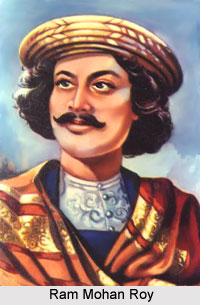 Raja Ram Mohan Roy was born in a village of Murshidabad district in the Indian state of West Bengal. He was born on 22nd May in the year 1772. Ramakanto Roy, an orthodox Brahmin, was his father. His parents were highly devotional towards God. They had immense faith in God and religion in general, and performed all the duties set down by their religion.
Raja Ram Mohan Roy was born in a village of Murshidabad district in the Indian state of West Bengal. He was born on 22nd May in the year 1772. Ramakanto Roy, an orthodox Brahmin, was his father. His parents were highly devotional towards God. They had immense faith in God and religion in general, and performed all the duties set down by their religion.
Right from his young age, Ram Mohan was devoted to Lord Vishnu. He would not put down the `Bhagavantha` without completing the reading of Valmiki Ramayana. But when he came to know that his mother also was fasting, he had his food for her sake. In his 14th year he was about to become a monk. But his mother came in his way.
Education of Ram Mohan Roy
During the Muslim rule the language used was Persian. Proper knowledge of Persian and Arabic was also very necessary to get employment or to correspond with the government. Ram Mohan also received education in Sanskrit, Bengali, Persian and Arabic in his own village. Though it can be said that Ramakanto was very traditional, but he wanted his son to receive higher education. So for this purpose he had sent him to Patna (now capital of Indian state of Bihar) in his ninth year. As a student Ram Mohan was very intelligent. He learned Persian and Arabic under popular Muslim teachers in Patna. Euclid and Aristotle were two great philosophers who lived in Greece, hundreds of years ago. Ram Mohan read their works in Arabic. By studying their books, Ram Mohan developed the ability to think for himself.
Believers of God that lived in India during that period worshipped pictures and idols of the same, and Ram Mohan wondered over the existence of God in any proper form. He did not believe in idol worship, vehemently opposed them, and festivals at home. On the other hand, his father - who was a very firm believer in idol-worship, felt he was doing wrong. He often advised him. The son did not change his mind. Owing to differences between Ram Mohan and his parents, he left the house.
Sanskrit Education for Ram Mohan Roy
Later on he received his education in Sanskrit language and Sanskrit literature as well. After his marriage, he went to Varanashi and studied the Vedas, the Upanishads and Hindu philosophy deeply. When his father died in 1803 he returned to Murshidabad.
Social Reforms of Raja Ram Mohan Roy
Social reforms of Raja Ram Mohan Roy have helped India to come out of the jinx of social taboo and malpractices. His was brought up in a very rich and wealthy family, and was witness to all the aspects of Brahmin culture that was prevalent in Bengal during that time. Ram Mohan Roy was born in the village of Radhanagar in Bengal in 1772. His family were of the Vaishnava sect of Hindu religion. Moderately prosperous landowners, they had served for several generations as revenue officials under the Mughals. Ram Mohan was married twice before he entered his teens, this being customary among high-caste families, among whom child marriage and polygamy were both very common.
When the practice of sati was legally abolished in 1829, the credit for its abolition was given to the Governor General, Lord William Bentinck. However, as a contemporary English observer, herself a woman, pointed out - the legislation could not have been brought about `but for the powerful though unacknowledged aid of the great Hindu philosopher Ram Mohan Roy. Roy`s` great contribution towards this reform was to demonstrate that sati was not a religious duty sanctioned or upheld by Hindu scriptural tradition.
Through the 1820s, Roy`s ideas were being propagated through his Bengali newspaper, which was called the Sangbad Kaumudi, or the `Moon of Intelligence`.
In December 1921, the Calcutta Journal, a periodical of (and for) the English in India, wrote of Roy`s newspaper that `she will be the means of the moral and intellectual renovation of India`. Nine years later, a London magazine described the Sangbad Kaumudi as `the Morning Chronicle of India, advocating freedom, civil and religious, opposed to corruption and tyranny, and labouring, we are happy to say effectively and extensively, to eradicate the idolatrous rites of the Brahmins, and awaken the Hindus to a sense of the degradation and misery into which they have been plunged`.
In 1830 Ram Mohan Roy was sent by the now much-weakened Mughal emperor to England, to petition the King to increase his allowance and perquisites. Raja Ram Mohan Roy`s visit to England made a lot of difference in the social structure of India. There he met with officials of the East India Company, lobbied with members of Parliament, was granted an audience with the King and wrote and published books on Indian economics and law. He exchanged views with British Utilitarians and English Socialists and also travelled to Paris. His biographer Sophia Dobson Collet remarks that `as he had interpreted England to India, so now he interpreted India to England`. In London, he watched with interest from the sidelines as Parliament passed the Reform Bill of 1831, which extended the franchise to a greater number of British men.
Abolition of Sati System
Ram Mohan played a major role towards abolition of sati system. When Ram Mohan`s brother - Jagmohan died, his wife Alakamanjari had to observe `Sahagamana` (that is, she was to be burnt alive with the dead body).All arrangements were made for cremation. Ram Mohan objected and begged his sister-in-law not to observe "Sati". All people were against Ram Mohan, and Alakamanjari was forced to the funeral pyre with the corpse. The pyre was set on fire.
This scene touched Ram Mohan and thus instigated him to fight against the system of Sati. Many people opposed Ram Mohan, but he did not flinch. Even the people of the West, who saw all this wondered, when even the government was afraid to interfere in this matter, Rammohan risked his life and fought against this evil practice. In the end, he won and the government made `Sati` a crime. Along with the fight against Sati, Ram Mohan started a strong movement in favour of women education and women`s right to property. He showed that woman enjoyed equal freedom with man according to Hinduism.
Formation of Atmiya Sabha
Ram Mohan lived in a period when child marriage and sati was highly practised among the people in society. Wives were burnt along with the dead husband whether she was willing or not. Girls were married off when they were five or six years old. Ram Mohan was sick and tired of these practises. Though he had high regard for Hindu religion but he felt that Hindus had yet to know about the religion correctly. He preached for equality among men and women, and people should also give up superstitious beliefs.
He tried to bring about a change in society and as a result gathered few like minded people for the process. An association of such close friends was formed. It was called `Atmiya Sabha` (The Society of Friends). Religious discussion took place there. The members had to give up idol-worship. They had to spread the Society`s views on religion among the people.
Ram Mohan`s Reforms for the Poor
When Roy was in Kolkata, he made immense contributions for the betterment of the poor people. He visited the houses of poor and needy people, in slums and talked to them and helped them out with food and money.
Educational Reforms of Ram Mohan Roy
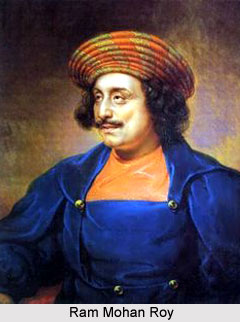 Educational reforms of Ram Mohan Roy improved the learning system in the country. The socio-economic and the political condition of the 19th century India made the learning and education necessary in India. The learning of English and Western education became indispensable. However, the historians have opined that primarily the economic factor was responsible for the introduction of the English language and the western literature. In British India, a system of education was necessary which could help to earn livelihood. Due to these circumstances, the aspects of education became wider in India.
Educational reforms of Ram Mohan Roy improved the learning system in the country. The socio-economic and the political condition of the 19th century India made the learning and education necessary in India. The learning of English and Western education became indispensable. However, the historians have opined that primarily the economic factor was responsible for the introduction of the English language and the western literature. In British India, a system of education was necessary which could help to earn livelihood. Due to these circumstances, the aspects of education became wider in India.
The western education in India spread mainly due to the efforts of the progressive Indian elements that promoted the social reforms. Social reforms of Raja Ram Mohan Roy not only liberate India from the shackles of superstitions but also introduced a new system of education in India. Raja Ram Mohan Roy believed education to be an implement for social reform. He protested against the government`s policy to strengthen the Sanskrit Colleges in the Presidency Towns of Kolkata, Varanashi and Chennai and urged for the establishment of more oriental colleges. He wrote to Lord Amherst that education of Sanskrit language and Sanskrit literature would do nothing and had no practical use. Rather he requested him to promote the western education in India. He felt that the youths could not adapt themselves according to the changing societies if they cling to the age-old Vedantic philosophy or doctrines. Ram Mohan was the chief advocate of the modern process of education and the scientific learning. The improvement of native people was the chief motive of Ram Mohan Roy.
Therefore, he helped the British government to promote a more liberal and enlighten system in learning. In the new system of education he introduced the s subjects of practical use like Mathematics, Natural Philosophy, Chemistry, and Anatomy with other useful sciences. The protests of Raja Ram Mohan found expression when the Government was agreed to encourage the study of English as well as the other oriental languages. A grant was sanctioned for the Calcutta Hindu College, which was set up in the year 1817 by the enlightened Bengalis. The Hindu College was set up with the intention of imparting education in English .The system of education of the Hindu College also emphasized the study of Western Humanities and the sciences.
Ram Mohan formed an association of English and Hindu scholars. He started a college also and arranged for the teaching of modern subjects like Science, Political Science, Mathematics, and English. Not only had the introduction of western education, Ram Mohan Roy also promoted the growth and prosperity of the women education. He strongly believed that unless the womenfolk were educated, the society would not be liberated from the evils. Thus Raja Ram Mohan Roy promoted the Western education and India during that time witnessed a great progress in the field of education.
Religious Reforms of Raja Ram Mohan Roy
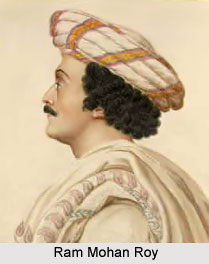 Religious reforms of Raja Ram Mohan Roy, like other reforms introduced by him, have helped India to attain freedom of expression in many ways. In the initial days, his differences with his father regarding the concept idol-worship took a serious turn. He was man who though for him. In the Upanishads and Vedas there are writings on freedom of thought. Ram Mohan admired this spirit of freedom. He proclaimed that simple living and high thinking should be a man`s motto in life. And he lived accordingly. Ram Mohan always believed that God does not reside in idol and vehemently opposed idol worship.
Religious reforms of Raja Ram Mohan Roy, like other reforms introduced by him, have helped India to attain freedom of expression in many ways. In the initial days, his differences with his father regarding the concept idol-worship took a serious turn. He was man who though for him. In the Upanishads and Vedas there are writings on freedom of thought. Ram Mohan admired this spirit of freedom. He proclaimed that simple living and high thinking should be a man`s motto in life. And he lived accordingly. Ram Mohan always believed that God does not reside in idol and vehemently opposed idol worship.
After finishing his studies Ram Mohan worked for British East India Company at many places in Bengal, before settling in Kolkata in 1815 - year of Battle of Waterloo. He had already published several books by then. First among his books were written in Persian language with the preface written in Arabic. It was a direct attack on idol worship.
After he moved to Kolkata, Ram Mohan became very much involved in social and literary works. He even translated the Upanishads written in Sanskrit language into Bengali language. He also published several work in English condemning the Sati, and also indulged in debates with traditional scholars on the rights of Hindu women.
He also contested the assertions of Christian`s missionaries that their religion was better to all others. He in the year 1815 founded the Atmiya Sabha or Friendship Association, as it is also known as, among other things, he went in search for elements common to various religious traditions.
By this time, Ram Mohan himself came to believe in the concept of omnipresence of God, who is the only proper object of religious veneration, is one and undivided in person. He also stated that this was the very message of Vedic literature and of the Bible and Holy Quran as well. He started to promote messages about inter-religious understandings and in the process wrote a book on precepts of Jesus Christ and began to work on life of Prophet Muhammad.
While he was involved in the process of revolution, he was roundly abused by traditional Hindus, who derided them as sinful atheists and moderns blinded by passions. He was not supported by the British as well. They criticized that he resisted conversion and that his high regard for Jesus did not expand to acknowledging his religion.
Roy in the year 1816 opened a school for boys, whose medium of instruction was English. In 1821 he started a weekly newspaper in Bengali language (first of its kind in any Indian language). Thereafter he started a paper in Persian as well (of which, as with its Bengali predecessor, he wrote all the contents). He founded the Brahmo Samaj (the Society of God), in 1828 which sermonized the love and worship of the One God on the basis of what its creator claimed were the innovative wisdom of Vedas.
Ram Mohan Roy`s Regard for Hinduism
There were, however, some Christian priests who were happy at Roy`s enthusiasm and interest for doctrines of Christianity. They even suggested that he should convert to Christianity. These priests could not understand mind of Ram Mohan who was staunch believer of Hinduism. He had immense admiration and respect for Vedas and Upanishads in Hinduism religion, which he had studied deeply.
Some men spoke lightly of the Vedas and the Upanishads. Ram Mohan gave them a very clear answer: "There is only one God in the universe. He has no form and qualities which men can describe. He is full of joy. Every living being has an element of God. These noble ideas sparkle in the Upanishads. Moreover, these books support people to reflect for themselves, they strike out original paths. They do not chain man`s intelligence." Just as he damned the dreadful customs of the Hindus he condemned the superstitions of the followers of other religions.
Early Political Life of Raja Ram Mohan Roy
Early political life of Raja Ram Mohan had immense impact on modern Indian history. It actually led to the complete revival of ethical principle of Vedanta school of philosophy as found in Upanishads. He preached about the oneness of God and also made translation of Vedic scriptures into English and co-founded Calcutta Unitarian Society - founded the Brahmo Samaj and also campaigned against Sati. He also sought to integrate Western culture with features of Indian traditions. He also set up schools to modernize education in India.
During this period he also worked as political agitator and agent while also being employed by British East India Company and simultaneously pursuing his vocation as a Pandit. In the years spanning from 1796 and 1797 the troika of Carey, Vidyavagish and Roy made-up a bogus religious work known as the Maha Nirvana Tantra (or "Book of the Great Liberation") and tried to depict it as an antique religious manuscript to "the One True God". The judicial section of the document was used in the law courts of the English settlements in Bengal as Hindu Law for adjudicating upon property disputes of zamindari. However, British magistrates and collectors began to suspect it as forgery and its usage as well as the dependence on pundits as sources of Hindu Law was quickly denounced. Vidyavagish had a nasty fall-out with Carey and separated from the group but also maintained ties to Ram Mohan. The importance of Maha Nirvana Tantra for Brahmoism lay in the riches that accumulated to Dwarkanath Tagore and Ram Mohan Roy by its judicial use, and not due to any religious wisdom within.
In 1799, Carey was joined by missionary Joshua Marshman and the printer William Ward at the Danish settlement of Serampore. From 1803 to 1815 Ram Mohan worked in the British East India Company and provided writing service, commencing as private clerk "munshi" to Thomas Woodforde, Registrar of the Appellate Court at Murshidabad, whose distant nephew, also a Magistrate, later made a living off the spurious Maha Nirvana Tantra under the pseudonym Arthur Avalon.
Raja Ram Mohan Roy, in 1815 formed "Atmiya Sabhan", and spent many years at Rangpur and elsewhere with Digby, where he renewed his contacts with Hariharananda. William Carey had, by this time, settled at Serampore and the trio renewed their association with one another.
British East India Company was extracting money from India at a very high rate (about three million pounds a year) in 1838. Raja Ram Mohan Roy estimated how much money is laundered with and what is the exact amount that is driven out of the country. He also predicted that around half of the total revenue collected in India was sent out to England, leaving India to fill taxes with the remaining money.
In the beginning of 19th century, after the Battle of Plassey and Buxar (population of the Muslim community decreased considerably) posed a political threat to the Company. Ram Mohan was now chosen by Carey to be the agitator among them. In the next two decade, after Carey`s secrete tutelage, Ram Mohan started his attack against the citadels of Hinduism of Bengal, namely his own Kulin Brahmin priestly clan (then in control of the many temples of Bengal) and their priestly excesses. The theological and social issues Carey chose for Ram Mohan were also calculated to weaken the hold of dominant Kulin class most importantly for younger disinherited sons forced into service who formed the mobile gentry or "bhadralok" of Bengal, from the Mughal zamindari system and align them to their new overlords of Company. The Kulin excesses targeted included child marriage and dowry. In fact, Carey tried to convert Raja to Christianity and appointed a religious priest to try to convert Raja, although the priest later accepted Hinduism.
Raja Ram Mohan Roy’s Visit to England
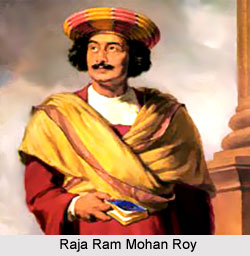 Raja Ram Mohan Roy`s visit to England was a crucial in the perspective of breaking the taboo in the then Indian society. There was a time when Indian going to the foreign lands was considered wrong, and there was religious connotation as well. About hundred and fifty year ago, it was considered a sin and irreligious that for a Hindu to cross the sea.
Raja Ram Mohan Roy`s visit to England was a crucial in the perspective of breaking the taboo in the then Indian society. There was a time when Indian going to the foreign lands was considered wrong, and there was religious connotation as well. About hundred and fifty year ago, it was considered a sin and irreligious that for a Hindu to cross the sea.
It was Raja Ram Mohan Roy who actually rejected this very idea and went to England. The British government granted the allowances to Akbar the Second, the Mughal King of Delhi. But it was really a very small amount. However, Ram Mohan has to submit a representative to the King of England to increase the same. The King of Mughal Empire (second of the Muhghal Dynasty) decided to send Ram Mohan to England at his own expense. Before he left for England, the King conferred him to the title of "Raja".
Another crucial reason for Ram Mohan to visit England was to plead before the parliament for the complete abolition of `Sati`.
There were many people, during that time, who objected vehemently to the visit of Ram Mohan to England. There were people from the British government who also strongly opposed him visiting England. But by that time, he was very popular and his fame had already reached England.
When Ram Mohan landed in England - Liverpool, the honourable men of England were there to welcome him. The popular scholar and historian William Rathbone who was laid up with paralysis sent his son. He also fulfilled his last desire by inviting him and spending some time with him. Many associations honoured him. From England, he later visited France as well, and everywhere he was welcomed with open arms.
As the allowances of the King was ultimately not settled, it was then decided that he would be given rupees three lakhs annually. His efforts to abolish the Sahagamana` were also very successful. So when the bill was finally passed in the Parliament, happiness of Ram Mohan knew no bounds.
Right from his childhood Ram Mohan Roy was brought up in a wealthy family. He was a great man who did spend a lot of money for others, who were needy. In Kolkata, even people coming from foreign land would borrow money from him. This very man, when went to England was reduced to total dependence upon others, even for food. As a result the condition of his health got worse. The main reason for his financial difficulties was that the firm in which he had invested his capital became insolvent.
After a point to time, due to lack of financial support, his condition deteriorated. And he fell ill and became bed ridden. There were some who respected and loved him, actually took care of him during his bad days, like relatives. Doctors with great reputation treated him but his health did not improve.
Rammohan died on 27th September 1833. Ten years later, 1843, a friend visited England and removed the coffin of Ram Mohan from Stapleton Grove to Arno`s Vale, the cemetery on the outer part of Bristol, and buried it there. A memorial in Indian style was raised over his tomb.
Ram Mohan Roy and Brahmo Samaj
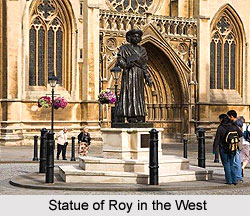 Ram Mohan Roy and Brahmo Samaj, which literally denotes communities of men who worship Brahman, are interlinked. Ram Mohan Roy has played a crucial role towards the foundation of Brahmo Samaj. The Brahmo Samaj was set up on 20th August 1828, and formed a strong platform for Ram Mohan`s expression of universal worship. The first secretary of the organization was one of the potent leaders of "Young Bengal" named Tarachand Chakravarti. At the beginning weekly services were organized, every Saturday. Later of course, it was transferred to Wednesday, a practice which has been retained to this day at the Brahmamandir of Rabindranath Tagore`s Shantiniketan in the Birbhum district of West Bengal.
Ram Mohan Roy and Brahmo Samaj, which literally denotes communities of men who worship Brahman, are interlinked. Ram Mohan Roy has played a crucial role towards the foundation of Brahmo Samaj. The Brahmo Samaj was set up on 20th August 1828, and formed a strong platform for Ram Mohan`s expression of universal worship. The first secretary of the organization was one of the potent leaders of "Young Bengal" named Tarachand Chakravarti. At the beginning weekly services were organized, every Saturday. Later of course, it was transferred to Wednesday, a practice which has been retained to this day at the Brahmamandir of Rabindranath Tagore`s Shantiniketan in the Birbhum district of West Bengal.
Ram Mohan and his admirers and follower used to attend payers in the church of Christian sect. Disciple of Rammohan - Chanrashekar Dev and others wondered why they should not have a prayer Hall of their own. Rammohan approved this idea. As a result they hired a building belonging to a man named as Ram Kamal Basu and also opened a Prayer Hall called "Brahmo Samaj".
The members of the organization, used to meet every Saturday. Vedic hymns and music of Upanishads were chanted by scholars. Religious discourses were held where Ram Mohan recited religious poems composed by him. Muslim and Christian boys sang songs in Persian and English. Many Hindus and people from foreign lands also attended these meetings.
`There is only one God. None equals Him. He has no end. He is present in all living beings` - this was the faith of the Brahma`s. This was the message of Ram Mohan. The Brahmo Samaj did not recognize differences of caste, creed, race or nationality. It emphasized the idea of universal brotherhood.
It is a hundred and forty years since Ram Mohan died. But his memory is still green in the minds of Indians. He was an intellectual who tried to lead India to modernity. He taught the Hindus to give up meaningless beliefs and customs. He was the lamp that led Hindus to the essence of origin of Hinduism. His memory itself guides us to a noble life.




















